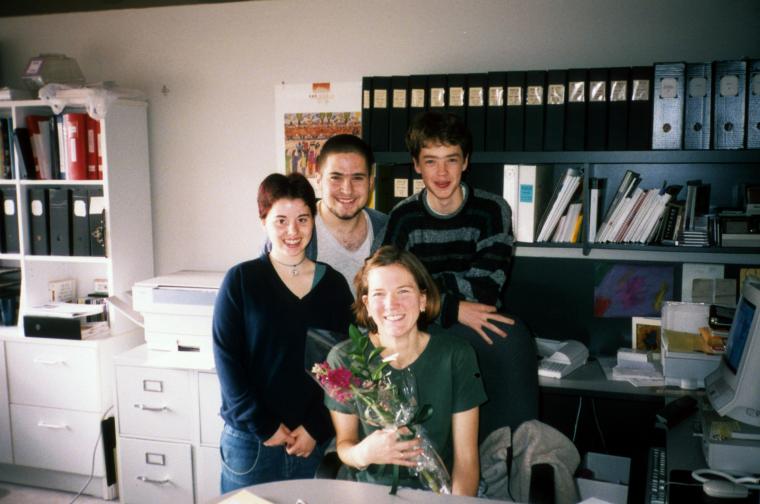Since the 1990’s I’ve been promoting the importance of ordinary acts of kindness by offering classes, making suggestions via a newsletter, and writing kindness-related articles. A couple of my favorite kindness activities come from when I was facilitating an in-person intergenerational kindness class in a Seattle retirement community in the late 1990’s. The class consisted of elderly residents of the Fred Lind Manor and students from the Puget Sound Community School (PSCS). We met weekly to chat about kindness and, more importantly, to complete a group action.
Early in the term, the students had the idea of delivering flowers to some of the retirement community residents who had a difficult time leaving campus. A florist nearby offered to donate day-old flowers to the cause and we went door-to-door in the community delivering bouquets. One resident, a man, cried upon receiving a bouquet, telling us he’d never been given flowers before. The florist was so generous, a kindness unto itself, that we had a lot of extra flowers. The PSCS students decided to surprise Melinda at the PSCS office and delivered a bouquet to her.
The next week, one of the teens suggested we go to a nearby coffee house and anonymously pay for the coffee of a random stranger, someone who arrives at the counter, orders, only to find their drink has been paid for, a kindness act familiar to most people interested in the subject. I was a little nervous about this idea as I hadn’t taken any of the elders outside of the retirement community before. But the enthusiasm was palpable and, frankly, contagious. I checked with the Activities Coordinator, a person I greatly admired, pretty sure she wouldn’t stop us.
So off we went, walking about five blocks to a nearby coffee house. There were nine of us who went, four teens, four elders, and me. We pooled our pocket change as we walked, planning who would say what, and trying to figure out how we all could inconspicuously sit in the coffee house in order to see our unknown recipient receive our intended kindness.
Can you picture it, four teens, four elders, and me trying to be inconspicuous in a small shop? It was probably 2:30 in the afternoon, too, an odd time to be out.
In we went and up to the counter our chosen representatives went, a teen and an elder, with a couple of dollars in loose change. They tried explaining the idea to the barista, who at first didn’t understand. But after a second or third explanation, she got it and broke into a huge smile. I still remember exactly what she was supposed to say to the recipient of our kindness upon presentation of the drink:
“You have been the victim of a random act of kindness.”
Meanwhile, the rest of us had tried fitting around a small table as far away from the counter as possible but still within eyesight of it. The two rejoined us and we didn’t have long to wait. In walked a person and up to the counter she went. Around our table we tried hard not to stare, each of us individually excited, the collective excitement seeming to scream out our presence.
It went down just as you’d expect it to go down, the person ordered her drink, was told it had been paid for and that she was a kindness “victim.” At first she didn’t seem to understand, then took a second to see if it was some kind of joke. Assured it was legit, she accepted her drink and with a warm smile she walked out of the store. All of this took less than two minutes.
Upon her exit, we exploded with happiness. The barista waved to us and we walked out, united in what felt to us was an act of superhero proportions. The elders seemed younger and the teens wiser. It wasn’t four teens, four elders, and me any more. It was nine people.
We floated back to the reality of the retirement community.















